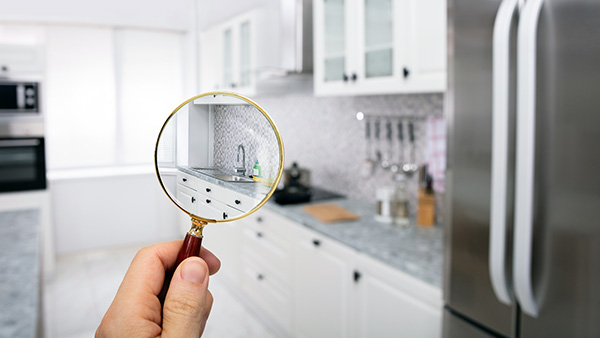
Inspect all the details of a home before you close on the purchase.
Buying a home is the biggest and most valuable purchase most people make. Many factors could draw you to a home: location, price, updated countertops or a large yard. If you are not careful, you could easily get distracted by the beautiful tilework in the bathroom or flowers in the garden and miss that the home needs an expensive repair.
The home inspection offers the buyer a deeper look into how the home has been maintained or whether it needs costly repairs. Once the inspection reveals the condition of the home, you may decide to walk away from the deal, negotiate with the sellers to pay for repairs or prioritize improvements to be made in the future.
If possible, attend the home inspection so you can learn as much as you can about the condition of the dwelling. It’s OK to take notes, ask questions and even take photos – some inspectors take photos to include in their report. Be prepared with a list of questions if you have noticed any concerns in prior visits.
A typical inspection includes:
- Foundation
- Basement
- Roof
- Gutters and downspouts
- Attic space
- Exterior brick, siding, stucco, and paint
- Electrical panel and outlets
- Thermostat, heating, ventilation and air conditioning
- Plumbing fixtures and water heater
- Walls, ceilings, floor
- Doors and windows
- Stairs and railings
- Walkways and driveways
- Garage
Features that may not be included in the inspection include:
- Trees and landscaping
- Outdoor lawn sprinklers
- Sewer line
- Swimming pool equipment
- Fireplace and chimney
- Roof or outdoor hardscaping covered by snow
- Mice, rodents or wood-destroying pests
- Radon
While the inspection will not tell you how much any of the repairs will cost, it can give you a better indication of the home’s condition. If there are major problems or more items than you are comfortable with, it might be a good idea to rethink the decision to purchase the home. In hot markets, sellers may be willing to accept only non-conditional offers where the buyer agrees to move forward without any inspections.
While waiving the inspection might not be a big deal on a newer home, it very well might be an expensive gamble on an older one. With such a large investment at stake, it’s usually best to know exactly what you are purchasing to make the wisest choice.
More Information
Blog post: Making the most of the home walk-through
This loss control information is advisory only. The author assumes no responsibility for management or control of loss control activities. Not all exposures are identified in this article. Contact your local, independent insurance agent for coverage advice and policy service.
